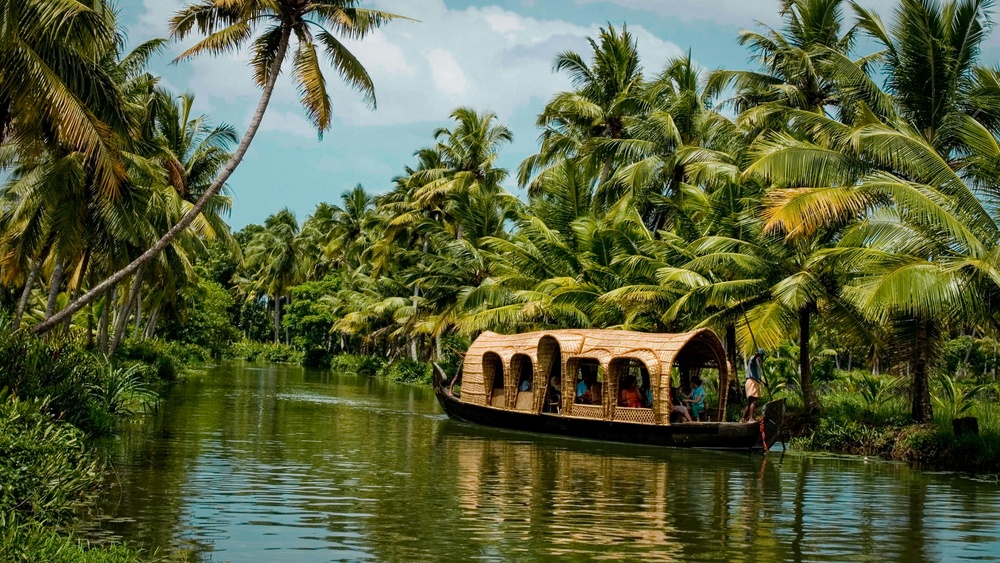Nestled on the southwestern coast of India, Kerala is fondly known as “God’s Own Country.” With its lush greenery, serene backwaters, sun-kissed beaches, exotic wildlife, and rich cultural traditions, Kerala tourism offers a uniquely enriching experience for travelers. Whether you seek relaxation, adventure, cultural immersion, or wellness, Kerala caters to all kinds of travel desires.
Let’s take a deeper dive into what makes Kerala a must-visit destination and why Kerala tourism continues to be one of the most sought-after travel experiences in India and beyond.
A Paradise of Backwaters
One of the most iconic features of Kerala tourism is its enchanting backwaters. These interconnected lakes, canals, and rivers stretch across the state and are best experienced aboard a traditional houseboat, known as a kettuvallam.
Popular destinations for backwater cruises include Alleppey (Alappuzha), often dubbed the “Venice of the East,” and Kumarakom, which lies alongside the scenic Vembanad Lake. These cruises offer a slow-paced, tranquil escape where travelers can witness village life, coconut groves, and paddy fields from the comfort of a floating home.
The Beaches of Kerala
Kerala boasts a stunning coastline along the Arabian Sea, dotted with pristine beaches that are perfect for both relaxation and water sports. Kovalam Beach, with its crescent-shaped shorelines and lighthouse, is ideal for sunbathing and surfing. Varkala Beach, perched on dramatic cliffs, offers both breathtaking views and a spiritual vibe, thanks to the nearby Janardana Swami Temple.
Other notable beaches include Cherai Beach near Kochi and Bekal Beach, famous for its sea-facing fort. For those seeking solitude, Kerala’s lesser-known beaches like Marari offer a peaceful retreat.
Hill Stations and Tea Gardens
While Kerala is known for its coastline and waterways, its hill stations are equally mesmerizing. Munnar, located in the Western Ghats, is a popular getaway for nature lovers, honeymooners, and photographers. Its emerald green tea plantations, misty hills, and waterfalls make it a quintessential part of Kerala tourism.
Other hill destinations include Wayanad, known for its caves, wildlife, and tribal culture, and Thekkady, home to the Periyar Wildlife Sanctuary. These regions are also ideal for trekking, spice plantation tours, and eco-tourism.
Rich Cultural Heritage
Kerala tourism is not just about nature—it’s also a gateway into a deeply rooted culture. The state has a rich tradition of classical dance forms like Kathakali and Mohiniyattam, which are often performed for tourists at cultural centers and festivals.
Another highlight is Kalaripayattu, one of the oldest martial arts in the world, which originated in Kerala. Visitors can watch live demonstrations and even participate in introductory workshops.
Kerala is also known for its festivals like Onam, the harvest festival celebrated with grand feasts, flower decorations, boat races, and traditional games. Thrissur Pooram, with its temple elephants and fireworks, is another spectacle that draws global attention.
Ayurveda and Wellness Tourism
A major pillar of Kerala tourism is wellness. The state is the cradle of Ayurveda, the ancient Indian system of medicine. Kerala offers numerous authentic Ayurvedic resorts and treatment centers where visitors can rejuvenate with massages, detox therapies, yoga, and meditation.
Destinations like Kumarakom, Kovalam, and Varkala have emerged as global wellness hubs, attracting travelers seeking holistic healing and natural therapies.
Ecotourism and Wildlife
Kerala’s biodiversity is staggering, and Kerala tourism promotes several eco-tourism initiatives that protect the natural environment while offering immersive experiences. Periyar National Park in Thekkady is one of the top spots to see elephants, deer, and even tigers in their natural habitat.
Other notable wildlife sanctuaries include Silent Valley National Park, Wayanad Wildlife Sanctuary, and Eravikulam National Park, the latter being home to the endangered Nilgiri Tahr and the beautiful Neelakurinji flowers, which bloom once every 12 years.
Bird watchers should not miss Kumarakom Bird Sanctuary, where migratory birds flock annually, including the Siberian crane.
Culinary Delights
Food is an integral part of Kerala tourism, and the state offers a feast for the senses. Traditional Kerala cuisine is rich in spices, coconut, and seafood. Must-try dishes include:
- Sadya: A vegetarian banquet served on a banana leaf, typically during festivals.
- Appam with stew: A fermented rice pancake served with a creamy coconut-based curry.
- Karimeen pollichathu: Pearl spot fish cooked with spices and wrapped in banana leaf.
- Malabar biryani: A flavorful rice dish from northern Kerala.
Street food and toddy shops (serving local coconut-based alcohol) add a rustic charm to the gastronomic journey.
Easy Accessibility and Hospitality
Kerala is well-connected with three international airports—Kochi, Trivandrum, and Calicut—making it accessible from all parts of India and abroad. The people of Kerala are known for their warmth and hospitality, and the state has a high literacy rate, which enhances communication for tourists.
Kerala also boasts a well-developed network of homestays, eco-lodges, luxury resorts, and budget accommodations, ensuring comfort for every type of traveler.
Conclusion
Kerala tourism truly lives up to its title as “God’s Own Country.” From tranquil backwaters and golden beaches to lush hills, wildlife sanctuaries, vibrant festivals, and healing Ayurvedic therapies, Kerala offers a travel experience that is both diverse and deeply fulfilling. Whether you’re planning a honeymoon, a family vacation, a solo retreat, or a cultural exploration, Kerala is a destination that promises memories for a lifetime. Plan your journey and let the soul of Kerala leave an imprint on your heart.



